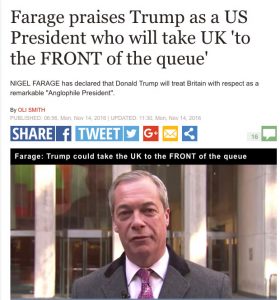
This week a story re-appeared about Trump wanting to force the NHS to pay more for drugs, as part of a possible trade deal between the UK and the US.
His argument seems to be that putting “America first” means stopping foreigners “freeloading”. The actual point is that the NHS (via NICE) operates as a single payer, and so has more muscle than the fragmented US system, where payments are made by individual health insurance companies.
That is in stark contrast with Nigel Farage’s attempts to claim that Trump would be a president who would take the UK “to the front of the queue”.
Farage being wrong is hardly news-worthy. But this calls to mind some perceptive comments in the first chapter of Nick Clegg’s How to stop Brexit, where he points up the string of things which have led to the imagination of Britain being an exception — not least the fantasy that we alone won the Second World War (which ignores the fact that we were in deep trouble until the Americans joined in). He continues:
By the 1960s, however, a reluctant acceptance that Britain had to change had set in. Post-imperial Britain was no longer as powerful on the world stage, and we grudgingly accepted that it was time to seek ore than a stand-off role in Europe.
With that mindset, it is not surprising that there was little fanfare when we finaly made the leap and joined the rowing European club… Basic economic necessity, rather than ideology, hope or inspiration, lay behind Britain’s decision to end the country’s splendid isolation. (pp7–8)
Whether the British Empire was as glorious as its proponents claim is a very open question, but it is possible to think of a time when the UK and the US were equals.
Farage’s confidence in a special link with Trump is redolent of those times. But in leaving the EU, the UK does drop down the league table. We face being greatly weakened. We are far from any illusion of equality with the US. If penalising the NHS meets Trump’s campaign promise to put “America First” it will happen.
What this unseemly episode shows is Britain (or at least, its Faragist / Brexiteer streak) risking future on idealised fantasies of the past. It’s no wonder that some civil servants have disparaingly dubbed the vision of multiple trade deals as “British Empire 2.0”.
The fantasy of the UK relating to the US as an equal is dangerous. Donald Tusk summed it up brilliantly: “Europe should be grateful to President Trump because, thanks to him, we have got rid of all illusions. He has made us realise that, if you need a helping hand, you will find one at the end of your arm.”
In being so wrong, Farage has demonstrated (again) that the UK’s most important friends lie across the Channel, not across the Atlantic (or in the former colonies which we treated badly).